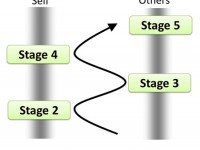This text highlights the main benefits of integrating research in adult development into executive coaching practice. Reading the text from a coaching point of view will be a first step to the practice of developmental coaching, with a focus on working withhigher level executives. The text refers to CDF, the Constructive Development Framework. Introduction to Developmental Coaching for Executives Read More...
Category: Coaching
Short Characterization of the CDF-Based Coaching Methodology
This short article describes what makes CDF-based coaching unique and makes it different from other coaching approaches. The CDF-based coach training method enriches approaches based on theories of adult learning by insights and practices derived from theories of adult development over the lifespan (1975-1995). CDF further enriches theories of adult development by insights derived from Critical Theory elaborated at the Frankfurt School between 1945 and 1975. Researchers of adult learning and development have only just begun to talk to each other, so that a synthesis of the two lies in the more or less distant future. The main result of including in coaching techniques of Critical Theory (Adorno) is that the emphasis of CDF-training is on the coach, not the client, in particular the coach as a “critical, deep thinker” who can guide the client’s adult development, fully aware of the client’s present developmental profile. Learning and development are seen in CDF as entirely different. “Learning” is accumulation of knowledge and experience over time (measured by horizontal snapshots at a particular time point), while “development” is a discontinuous deepening of meaning making and thinking across individuals’ entire lifespan (measured longitudinally, across time, through structured interview). Whereas adult learning approaches are... Read More...
How Do You Teach Your Client to Think Developmentally?
The article is based on a dialog between a mentor and a behavioral coach who desires to learn to think developmentally. After an introduction on coaching focused on clients’ Frame of Reference, the four individual dialogs deal with the three aspects of human capability, the nature of developmental scores, the nature of behavioral “need-press” scores, and the synthesis of CDF data for use in coaching practice. Laske 2007 Mentoring a Behavioral Coach to Think Developmentally Read More...
CDF Works on Many Levels
In this short post, I want to draw attention to the fact that what we call CDF -- short for Constructive Developmental Framework (see Wiki) -- is a multilevel methodology, not only a methodology comprising three interrelated modules. What I mean by that is that a CDF user can use this methodology on at least four levels if not more: 1. The real-time interviewing and assessment level 2. The scoring, interpretation, and feedback level 3. The role design level 4. The human-capital level where CDF is a decision theory, both practical and teachable, regarding what is the requisite match between contributors' developmental profile (size of person) and their accountability level (size of role). Up to now, CDF has mainly been taught at the first two levels, under the label of "case studies". These are focused on individual contributors and team members. Jan De Visch has developed theories about the role design level, spelled out in his two books, especially in "Minds Creating Value" (2014, see www.connecttransform.be). I find level 1 highly important because at this level CDF functions in real-time, and what it un-earthes through interviews are DTF generative mechanisms creating movements-in- thought. This is the level of dialog, and... Read More...
Team Coaching from an Adult-Developmental Perspective
In this course, team leaders and team coaches acquire new competences pertaining to working with teams. Specifically, they learn to experience work with team members from a social-emotional perspective and therefore are able to discern different levels of team maturity. Immersing themselves in different ways of meaning making, they also come to understand that the cognitive level of discourse of a team, that is, complexity and fluidity of the discourse, is a function of team members’ maturity both in *thinking* and *meaning-making*. By sharpening their expertise for intuitive as well as reflective work with teams, participants prepare themselves for functioning at a higher level of leadership than they have so far been able to operate on. The practical highlight of the course is that participants are introduced to dialectical thinking, a form of holistic, systemic, and transformational reading of, and responding to, the real world. Although the practice of dialectical thinking in this course is not as extensive as in the subsequent case study, participants gain a fair foothold in reflecting on how, rather than what, team members think, and this gives them new tools for intervening with teams they lead or manage. It also opens a door for them... Read More...
From “Developmental Theory” to a Dialogical and Dialectical Epistemology
By Otto Laske - In this text, I focus on the central relevance of interviewing skills for being able to lead a structured developmental dialog in the sense of the Constructive Developmental Framework (CDF), whether social-emotional or cognitive. I want to make it clear that the certification as a Master Developmental Consultant/Coach at the Interdevelopmental Institute (IDM) is not a certification in practicing “developmental theory”, but rather an independent discipline derived from it, namely, a dialogical and dialectical epistemology. Developmental theory per se is taught at IDM only in applied courses which serve as a basis for learning the CDF epistemology, and in this sense are mere teasers for learning to think and listen developmentally, dialogically, and dialectically. What matters is not the theory, but its applications in work with human resources (“human capital”). This has always been the focus of IDM teaching. Abbreviations: CDF = Constructive Developmental Framework (Laske); DCR = Dialectical Critical Realism (Bhaskar); DSF = Dialectical Schema Framework (Basseches); DTF = Dialectical Thought Form Framework (Laske); IDM = Interdevelopmental Institute (Laske). *** When I started writing my two books on Measuring Hidden Dimensions in 2005, it was clear to me that the most progressive part of Kegan’s... Read More...
